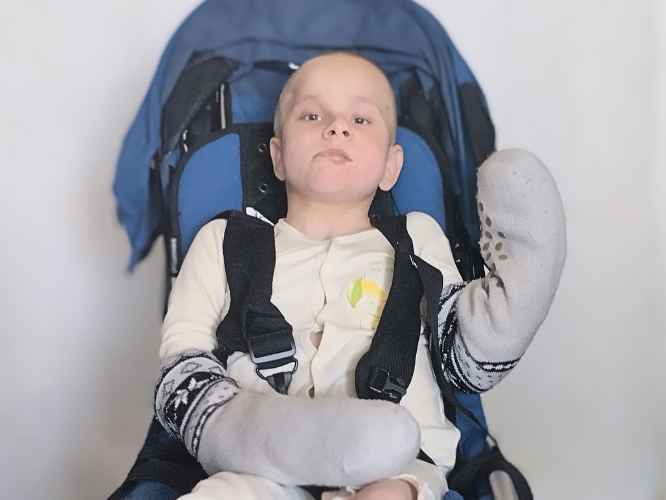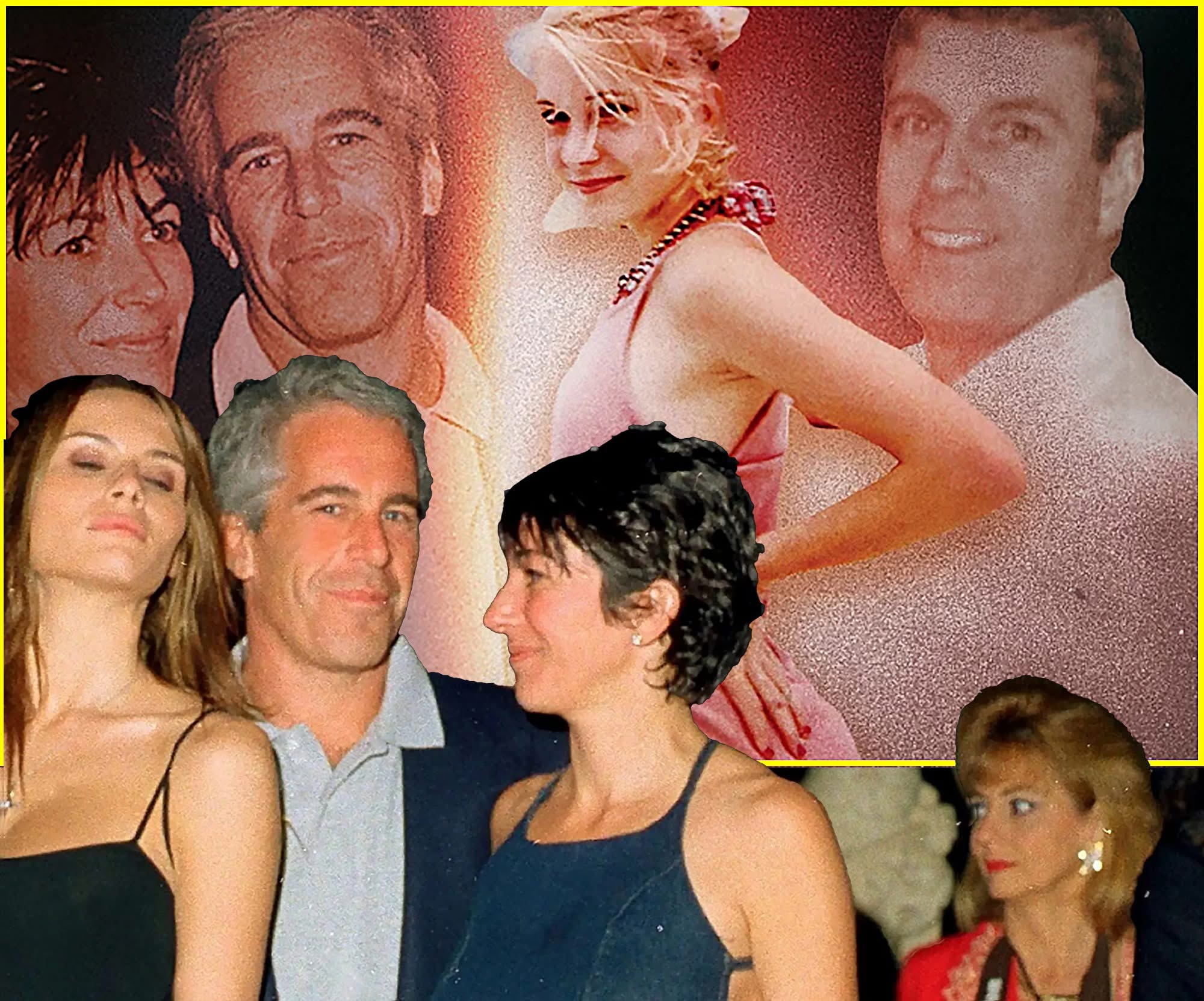Amelka’s Story – A Fragile Life Full of Silent Struggles
The little girl you see in this picture is our daughter, Amelka. To most people, she may look like any other child—innocent eyes, delicate hands, a small body that should be filled with the restless energy of childhood. But Amelka’s life has been anything but carefree. Instead of laughter, playgrounds, and the simple joys of being a child, her days have been filled with hospital corridors, medical equipment, pain, and silence.
From the very beginning, her story was marked by struggle. Amelka was only ten days old when we were rushed to a specialist hospital. At an age when most newborns are just beginning to open their eyes to the world, our little girl was being prepared for her first surgery. We thought—perhaps naively—that it would be the only one, that doctors would fix what was wrong, and that she would finally be able to live like any other child.

But things did not go as planned. After the operation, there was hope. The doctors reassured us that Amelka was stable and might recover. For a brief moment, we allowed ourselves to breathe. But then everything turned upside down. Something went terribly wrong. We watched as our daughter’s fragile body fought desperately, and death came to claim her.
Those were the darkest moments of our lives. Amelka’s tiny chest was open. The doctors tried everything. She was resuscitated for a long time, and for a moment, it seemed as if we had lost her forever. The despair that gripped us is impossible to describe—a feeling of emptiness, of falling into a bottomless pit. But then, against all odds, a miracle happened. Amelka came back to us.
We should have felt relief. And we did, briefly. But the fight for life left terrible marks on her small body. The lack of oxygen caused brain damage, and with that came a chain of challenges that no child should ever have to endure.
Amelka is now far behind her peers in development. She has been diagnosed with global developmental delay, low muscle tone, protein-energy malnutrition, and overall developmental disorders. In many ways, she is like a several-month-old baby, even though she should already be running, speaking, and discovering the world. She cannot walk. She cannot speak. She does not eat on her own. She lies still, fed through a tube, and often recoils from touch.
Our daughter has spent much of her short life in hospitals and clinics, places that became more familiar to her than playgrounds or kindergartens. Today, she has become a prisoner in her own home. Three times a week, a rehabilitation therapist comes to work with her. But even he, a man who has seen countless children fight for progress, now struggles to keep hope alive. Session after session, Amelka shows no signs of improvement. She suffers greatly, often screaming from pain.
The most heartbreaking part is that she cannot tell us what exactly hurts or how we can help her. She cannot say “it’s my head,” or “my stomach,” or “please hold me.” She suffers in silence, and we, as parents, are left powerless. That helplessness is perhaps the worst feeling of all.
Every day we are forced to put socks on her hands because she bites herself until she bleeds—sometimes down to the bone. This is how she releases the storm of emotions trapped inside her small, fragile body. It is a scene that no parent should ever have to witness, and yet it has become part of our daily life.
Despite everything, Amelka is still here. Her fragile life hangs on by threads of love, care, and medical support. But she needs more than just survival—she deserves some measure of comfort, some improvement in her quality of life. That is why we are now asking for help.
We dream of getting her a specialized bed designed to meet her unique needs. A bed like this would make her everyday life safer and more comfortable. It would also ease the heavy burden on us as her caregivers. Unfortunately, the cost is enormous—far beyond what we can afford. And that is just one expense among many. Every day brings new medical costs, new rehabilitation fees, new challenges that we must face.
To outsiders, it might seem like a simple piece of furniture. But to us, this bed represents dignity for our daughter, relief for her suffering, and the possibility of giving her even a small piece of the childhood she has been denied.
We often find ourselves reflecting on how unfair this is. Children are supposed to run, laugh, and play. They are supposed to fall, get up, and fall again as they learn to walk. They are supposed to call out to their parents, ask endless questions, and fill homes with joy and noise. But for Amelka, childhood is silent. Her voice is locked inside her. Her steps never came. Her laughter has been replaced by cries of pain.
Still, we hold on to hope. Hope that with the right equipment, the right care, and the compassion of others, Amelka’s days can be a little brighter. Hope that she will suffer less. Hope that, even if she never reaches the milestones of other children, she will know comfort, love, and dignity.
We know we cannot walk this road alone. That is why we are reaching out with open hearts, asking for support. Every gesture, every donation, every bit of kindness brings us closer to giving our daughter the life she deserves—a life not free from struggle, but one with more peace, more comfort, and less pain.
Amelka’s story is not just about suffering. It is about resilience, about a little girl who has already fought death and returned. It is about love—love so strong that it keeps us going even when the road seems endless. And it is about hope, the one thing we refuse to let go of.
From the bottom of our hearts, we thank you for reading about our daughter. If you can, please help us make Amelka’s world a little less painful, a little more filled with care. For her, even the smallest act of kindness can mean the world.
Teddy’s Journey: A Little Fighter With a Giant Spirit.1605
Teddy’s Story: A Little Warrior Facing Medulloblastoma
Teddy was just three years old when his life changed forever. In August 2021, shortly after celebrating his birthday, he was diagnosed with medulloblastoma, a type of aggressive brain tumour common in children. For his parents, the news was devastating. One week he was playing, laughing, and enjoying his early childhood milestones; the next, he was suddenly facing major surgery, hospital wards, and the uncertainty of life-threatening illness.
The diagnosis was followed by major brain surgery just days after his birthday. For a family that had been celebrating with cake and laughter, this sudden shift was overwhelming. Teddy’s tiny body was about to be subjected to the most intensive treatments a child could face, and his parents had to confront fears that no parent should ever know.

The Long Road of Chemotherapy
After recovering from surgery, Teddy began a course of five rounds of chemotherapy. Each round brought exhaustion, nausea, and countless hospital visits. As any parent would feel, his mother and father were terrified each day. Yet, as they describe, fear became a constant companion.
“We were very scared initially — as any parent would be. In fact, you’re always scared throughout the treatment. You quickly adapt… sadly, it becomes the new normal,” his mother shared.
Despite the pain and side effects, Teddy endured. He was small, but his spirit was strong. His smiles between treatments and his resilience inspired everyone around him — nurses, doctors, and family alike.
In early 2022, Teddy underwent high-dose chemotherapy, an even more intense treatment designed to target any remaining cancer cells. The treatments were grueling, and the toll on both child and family was immense. Yet, through every infusion, every night spent in the hospital, Teddy’s bravery never faltered.

A Setback and Radiotherapy
Sadly, in June 2022, Teddy experienced a relapse, a moment that crushed his family’s hopes after months of grueling treatment. Once again, they were thrust into uncertainty and fear. Doctors recommended six weeks of radiotherapy, another exhausting and challenging procedure designed to target the tumour with precision.
Through it all, Teddy showed extraordinary courage. Even when faced with discomfort and disruption to his young life, he smiled, played when he could, and drew strength from the love of his parents and the support of his medical team.
“Much of Teddy’s journey took place during the height of the COVID-19 pandemic,” his parents explained. The pandemic added another layer of difficulty. Hospital policies meant only one parent could be present during admissions, forcing long stretches of separation. Teddy’s mother recalls spending Christmas and New Year away from her family while tending to his care, a sacrifice emblematic of the hardships many families faced during this period.

Support from Medical Staff and Community
Teddy was treated on Elephant Ward at Great Ormond Street Hospital, where his family describes the staff as “gold standard.” His consultant, Dr. Mette Jorgensen, provided guidance, reassurance, and expertise that became a cornerstone of their journey. Every nurse, every doctor, every technician played a vital role in helping Teddy navigate his treatments with as much comfort as possible.
Beyond the hospital, the family received emotional and practical support from charities, most notably Lennox Children’s Cancer Fund. Through grants, days out, and thoughtful gifts, Teddy and his family found small pockets of joy amid a journey dominated by fear and uncertainty. These acts of kindness provided relief, connection, and moments of normalcy during an otherwise turbulent time.
“We are forever grateful to Lennox and the other charities that have helped us throughout his treatment. Thank you, Lennox,” his family said.
Living with Courage and Hope
Teddy’s journey is not only a story of medical treatments but also one of resilience, courage, and the human spirit. Each day, his family witnessed him grow stronger emotionally, even as his body endured the physical toll of surgeries, chemotherapy, and radiotherapy. The small victories — laughing during a hospital visit, holding his parent’s hand with trust, enjoying a day out supported by charity — became milestones of hope and perseverance.
His parents reflected on the duality of their experience. On one hand, the hospital stays, treatments, and relentless monitoring were exhausting and emotionally draining. On the other, witnessing Teddy’s bravery, his willingness to fight, and the unwavering support of medical staff and community provided light in some of the darkest days.
The Impact of COVID-19
The timing of Teddy’s treatment during the pandemic amplified the challenges. Safety protocols meant family members were separated, routines were disrupted, and isolation was frequent. For Teddy, this meant limited familiar faces during critical moments; for his parents, it meant emotional strain and sacrifices, including missing family celebrations. Yet, through this, Teddy’s resilience never wavered, and the family adapted, learning to find hope and small joys amid uncertainty.
Looking Forward
Today, Teddy continues to receive monitoring and follow-up care, ensuring that his hard-fought recovery remains on track. He has already faced more challenges in three years of life than many endure in a lifetime, yet he is a bright, energetic, and spirited boy.
Recently, Teddy received his new prosthetic leg, a milestone that symbolizes not just physical recovery but also independence, play, and the reclaiming of childhood. He races around with joy and energy, refusing to let anything hold him back. His laughter, curiosity, and determination are a testament to his courage and the unwavering love that surrounds him.

Gratitude and Legacy
Teddy’s story is a testament to the power of family, medical care, and community support. Organizations like Lennox Children’s Cancer Fund play an essential role in lifting families up, providing not just financial help but also moments of respite, joy, and normalcy during an exhausting journey.
His parents reflect on their experience with humility and gratitude, recognizing the extraordinary efforts of everyone who helped them:
“We’ve been separated for months at a time with constant hospital visits and admissions. We’ve missed sharing quality time together. We’ve received so much support from Lennox — lovely days out, parties, and just someone to have a rant with when it’s needed.”
Teddy’s story reminds us that even in the face of life-threatening illness, childhood can be reclaimed, joy can be found, and courage can shine through even the smallest among us.
✨ Teddy is living proof that resilience, love, and determination can carry a family through the most challenging journeys. He is a little fighter with a giant spirit, inspiring everyone who knows his story.
💛 We are proud to support Teddy and families like his, helping to provide care, hope, and moments of joy through Lennox Children’s Cancer Fund.



